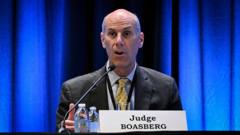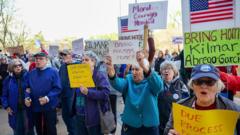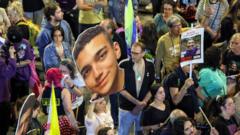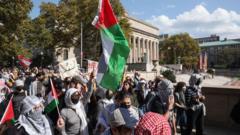Tensions rise in Israel as the Supreme Court deliberates on Prime Minister Netanyahu's controversial decision to remove the chief of Shin Bet, Ronen Bar, highlighting deep divisions within the nation.
Supreme Court Faces Turmoil Over Netanyahu's Intelligence Chief Dismissal

Supreme Court Faces Turmoil Over Netanyahu's Intelligence Chief Dismissal
Israel’s Supreme Court hears challenges against PM Netanyahu's decision to fire Shin Bet head Ronen Bar amid public uproar.
In an unprecedented courtroom drama, the Israeli Supreme Court commenced hearings on Tuesday concerning Prime Minister Benjamin Netanyahu's contentious decision to fire Ronen Bar, the chief of Israel's internal security service, Shin Bet. The proceedings are not only a pivotal moment for Israeli politics but also threaten to deepen an already polarized societal divide.
The case stems from allegations that Netanyahu acted out of distrust towards Bar, a key figure in Israeli security who has overseen significant operations, including the Gaza conflict and key negotiations with Hamas. Supporters of the Prime Minister argue that Bar's actions displayed disloyalty, while critics warn that this move sets a dangerous precedent, potentially undermining the independence of national security institutions.
As the court session unfolded, raucous protests erupted outside, forcing judges to temporarily halt proceedings, underscoring the emotionally charged environment surrounding this legal battle. The hearing was live-streamed, allowing the citizens of Israel to witness the unfolding controversy, but the public was removed from the courtroom due to disruptions.
This case captures the intense scrutiny surrounding Netanyahu’s governance as he navigates through accusations of undermining democratic norms in favor of consolidating his power. The implications of the Supreme Court's ruling could stretch far beyond this singular incident, potentially impacting the relationship between Israel's political leaders and its security apparatus for years to come.
Observers expect the discussions in court to extend throughout the day, but an imminent ruling is not anticipated, thus keeping the nation’s political fate hanging in uncertainty. As the saga continues, the public's response and the eventual court decision may further shape the narrative of Israel's governance and civil rights.
The case stems from allegations that Netanyahu acted out of distrust towards Bar, a key figure in Israeli security who has overseen significant operations, including the Gaza conflict and key negotiations with Hamas. Supporters of the Prime Minister argue that Bar's actions displayed disloyalty, while critics warn that this move sets a dangerous precedent, potentially undermining the independence of national security institutions.
As the court session unfolded, raucous protests erupted outside, forcing judges to temporarily halt proceedings, underscoring the emotionally charged environment surrounding this legal battle. The hearing was live-streamed, allowing the citizens of Israel to witness the unfolding controversy, but the public was removed from the courtroom due to disruptions.
This case captures the intense scrutiny surrounding Netanyahu’s governance as he navigates through accusations of undermining democratic norms in favor of consolidating his power. The implications of the Supreme Court's ruling could stretch far beyond this singular incident, potentially impacting the relationship between Israel's political leaders and its security apparatus for years to come.
Observers expect the discussions in court to extend throughout the day, but an imminent ruling is not anticipated, thus keeping the nation’s political fate hanging in uncertainty. As the saga continues, the public's response and the eventual court decision may further shape the narrative of Israel's governance and civil rights.



















